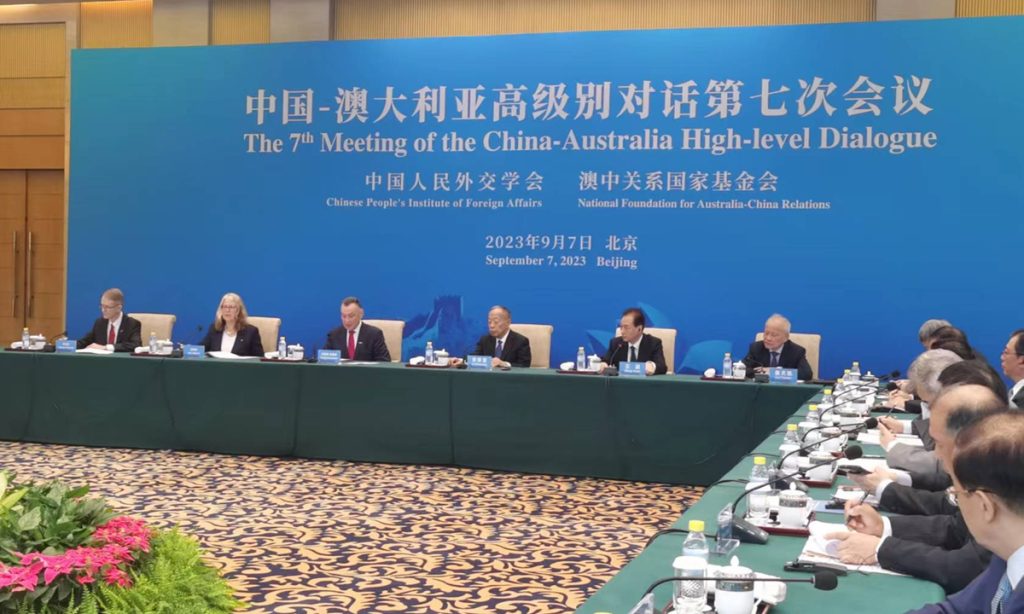Mutual respect key to further improving China-Australia ties

On the morning of September 7, while I was attending the 7th Meeting of the China-Australia High-level Dialogue in the Diaoyutai State Guesthouse in western Beijing, a young colleague of mine texted me a short message saying "Australian PM Anthony Albanese confirms visit to China 'later this year.'"
Later that same day, in response to a question, Chinese Foreign Ministry spokesperson Mao Ning told a routine press conference, "China welcomes Prime Minister Albanese to visit China at the invitation of Premier Li Qiang and stands ready to work with Australia to make sound preparations for the visit."
To people who have been keeping a watchful and hopeful eye on the development of the bilateral ties, this is really good news.
Back in December 2017, when I participated in, as a member of the Chinese delegation, the 4th Meeting of the China-Australia High-level Dialogue held in Melbourne, I also attended an event to celebrate the 45th anniversary of the establishment of China-Australia diplomatic relations. I still keep in my souvenir collection a pin that the Australian side made to mark the special occasion.
Then and there, it never occurred to me that bilateral ties would be put on a twisty and bumpy road in the next few years. Some overseas media outlets even said that bilateral ties had reached their lowest point since the establishment of the diplomatic relations in 1972. I don't think this is totally an exaggeration.
Until before May 2022, China-Australia relations were severely damaged due to the unwise and shortsighted China policies adopted by the previous Australian government. Bilateral trade suffered even more significantly.
Fortunately, with the joint efforts the two sides made in the past year, bilateral ties began to be warming up by the end of 2022. The resumption of the 7th edition of the high-level dialogue after a three-year hiatus - being held in each country in turn since its initial launch in 2014 till 2019 - indicated that bilateral ties have bottomed out. The latest dialogue was held to put into concrete actions items mentioned in the China-Australia Foreign and Strategic Dialogue Joint Outcomes Statement that the two sides issued after Wang Yi, member of the Political Bureau of the CPC Central Committee and Chinese foreign minister, held the sixth round of China-Australia Foreign and Strategic Dialogue with visiting Australian Foreign Minister Penny Wong on December 21, 2022 in Beijing.
The highly anticipated announcement of Albanese's scheduled China visit is timely and far more significant. It is an explicit signal that China-Australia relations are on their way to get back on the right track.
As one of the participants, I was not supposed to write about, in whichever capacity, who said what during the one-day, close-door high-level dialogue, which was conducted by "36 representatives from various sectors of the two countries for in-depth and constructive discussions on a wide range of issues concerning China-Australia relations in a candid, friendly and warm atmosphere," as Foreign Ministry spokesperson Mao Ning said at the routine press briefing.
But as a longtime observer of China-Australia relations, I would very much like to contribute for the betterment of bilateral ties by putting down my suggestions for the people-to-people exchanges.
First of all, a sound bilateral relationship is the foundation and prerequisite to boost people-to-people exchanges. To further advance bilateral exchanges in education, culture, tourism, media and art, and to consolidate the popular support for the bilateral relations in the respective country, we have to further improve the current status of bilateral ties. The two sides need to have more communications to reduce biases, to look at each other's development in a more positive perspective, to understand each other's political intentions more actively and to keep discarding the Cold War mentality. They need to establish more mutual trusts, continuously increase reciprocal inclusiveness, decrease or even get rid of misunderstandings and build up more links between the two countries.
Above all, mutual respect is the key to the improvement of the China-Australia relations.
Mutual respect, as I understand, is not just about respecting each other's economic power and the benefits that one side has brought to the other side. More importantly and significantly, it is about respecting each other's sovereignty, core interests and grave concerns, respecting different political systems, different histories and cultures, and managing properly the divergences.
China has always been showing its willingness to deepen bilateral ties with Australia in each and every sector. China's good will and the great efforts it has made in this regard should be cherished and respected, but should by no means be taken for granted.
Just as Mao Ning told the September 7 press briefing, "China always believes that a sound and stable China-Australia relationship is in the fundamental interests of the peoples of both countries, and conducive to peace, stability and prosperity of the Asia-Pacific and the wider world."
Both sides should make greater efforts to maintain the encouraging development momentum of the bilateral ties and work harder to push forward the much expected people-to-people exchanges.